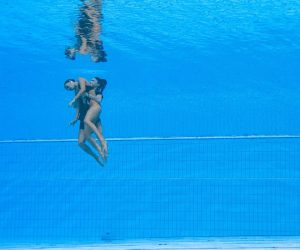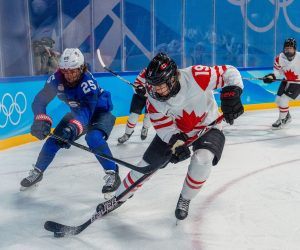Russian curler Alexander Krushelnitsky has been charged with a doping offense by the Court of Arbitration for Sport, an offense that could lead to the loss of medals and further consequences for other athletes from Russia.

Krushelnitsky won the bronze medal in mixed doubles curling along with his wife, Anastasia Bryzgalova, while competing under the Olympic Athletes from Russia (OAR) designation. The OAR team defeated Norway 8-4 in the bronze medal game.
Meldonium Found in Sample
But a drug test administered to Krushelnitsky showed that he tested positive for meldonium, a substance that was banned in 2016. While results from a test of a second sample haven’t been released yet, the Court of Arbitration for Sport says that it has “initiated a procedure” related to the failed test.
Fellow Russian players and coaches were stunned by the allegation. Most found it hard to believe that Krushelnitsky would risk doping, especially given the increased scrutiny that the athletes from Russia are under in these Winter Olympics, with some also questioning the benefits of doping for curlers.
“With us it’s not faster, higher, stronger; it’s about being more accurate,” said OAR women’s skip Viktoria Moiseeva. “I can’t imagine what kind of drugs you could use in curling…so it’s very hard to believe.”
But that assessment may be more about supporting a friend and training partner than the reality of the sport. Curling demands core and upper body strength as well as endurance, particularly for those who are doing the bulk of the sweeping.
The mixed doubles format places a particular emphasis on athleticism due to the faster pace of play and the fact that both players do a large amount of sweeping in each game.
“It’s physically demanding out there,” said Swiss women’s skip Silvana Tirinzoni. “We have to be fit, and we have to be working out. My sweepers are working out like five times a week, go to the gym, so [drugs] can help, but we shouldn’t do that. I think that’s stupid.”
Doping Charges Could Threaten Russian Reinstatement
According to a spokesman for the Russian delegation, Krushelnitsky has surrendered his accreditation for the Olympics and has left the Olympic village.
If the second sample is also positive and the allegations are confirmed, the doping charges against Krushelnitsky could have consequences that go far beyond his own athletic future. The IOC had been considering allowing Russian athletes to march under their own flag at the closing ceremonies, but a failed drug test could put such a gesture in jeopardy, especially since it was widespread doping issues that caused the Russian Olympic program to be banned from this year’s Winter Games in the first place.
“It’s a catastrophe, if it’s not just one Olympics but others too,” Moiseeva said. “It’s awful just to think about, to be honest.”
The failed drug test could also see the OAR mixed doubles bronze medals stripped and given to the fourth place team, Norway, which would mean the delegation from Russia would almost certainly leave without winning any medals.
The OAR women’s team has a 2-5 record and is all but eliminated from medal contention, with Coral listing them at 100/1 odds to win gold. Russia did not qualify a men’s team for the Olympics.











